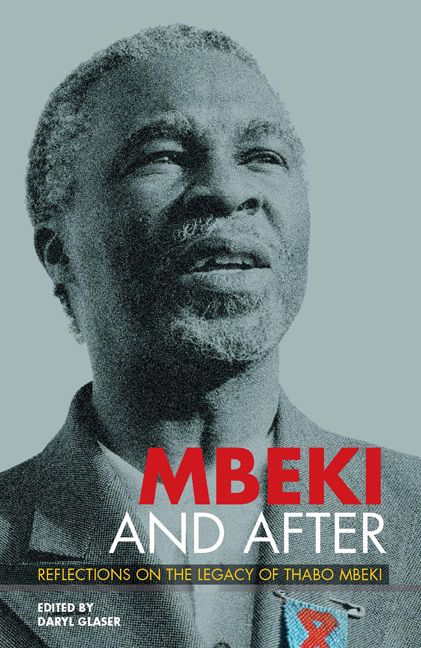Book contents
- Frontmatter
- Contents
- Acknowledgements
- Acronyms
- General Reflections
- The Mbeki Style Of Governance
- Mbeki And Society
- Mbeki And Race
- 7 Seeing ourselves as others see us: Racism, technique and the Mbeki administration
- 8 Towards a common national identity: Did Thabo Mbeki help or hinder?
- Mbeki Abroad
- Notes
- Contributors
- Bibliography
- Index
7 - Seeing ourselves as others see us: Racism, technique and the Mbeki administration
from Mbeki And Race
Published online by Cambridge University Press: 21 April 2018
- Frontmatter
- Contents
- Acknowledgements
- Acronyms
- General Reflections
- The Mbeki Style Of Governance
- Mbeki And Society
- Mbeki And Race
- 7 Seeing ourselves as others see us: Racism, technique and the Mbeki administration
- 8 Towards a common national identity: Did Thabo Mbeki help or hinder?
- Mbeki Abroad
- Notes
- Contributors
- Bibliography
- Index
Summary
There is some embarrassment attached to devoting an analytical article to an individual politician.
This does not denote allegiance to the structuralist prejudice which assumes that individual human agency is irrelevant to history; that social forces determine our fate regardless of who is in charge of government. The claim that leaders are simply instruments of forces they neither create nor control is largely outdated; most scholars across the spectrum have accepted that leadership matters. The embarrassment is, rather, a reaction to an extreme over-correction of structuralism in our national debate and in scholarship, which seems to seek to reduce the modern and current history of South Africa to a discussion of prominent individuals divorced from the social and political context in which they operate. This trend is, perhaps, best illustrated by the fact that the past few years have seen a spate of biographies of political leaders which greatly dwarf, both in quantity and influence, attempts to analyse social trends.
The problem with this approach is that it may encourage a view of politics which makes it far harder for us to understand our condition or to remedy its weaknesses.
Much commentary and some scholarship on the rest of the African continent has, for example, been preoccupied with denunciations of the quality of leadership foisted on Africans. While the complaint is broadly accurate it fails to address the obvious question – why is poor leadership found in such abundance on the continent? The question is eminently answerable and some of us have made the attempt (Friedman 2008), but the obsession with leaders tends to remove it from the scholarly and the public agenda.
If we reduce our past and present to the role of leaders it is difficult to see how usable antidotes for problems might emerge – if there is a consensus that Mandela is a good leader, Mugabe a bad one, our remedy is surely to avoid Mugabes and embrace Mandelas. But since no-one seems able to recommend how this might be done the emphasis on leadership seems to reduce Africans (and anyone else to whom it applies) to passivity, doomed to hope that their political processes throw up acceptable leaders but largely unable to determine whether they do.
- Type
- Chapter
- Information
- Mbeki and AfterReflections On The Legacy Of Thabo Mbeki, pp. 163 - 186Publisher: Wits University PressPrint publication year: 2009



